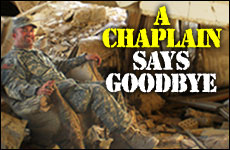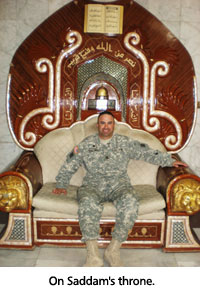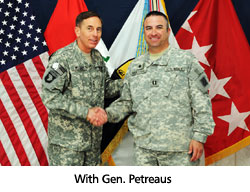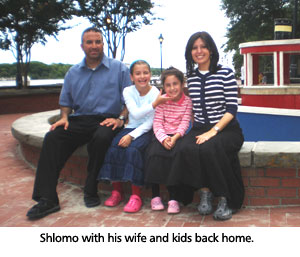 Iran’s Attack on Israel
Iran’s Attack on Israel


3 min read
4 min read
4 min read
9 min read
What a long, strange trip it's been.
My 15-month deployment to Iraq as a chaplain in the U.S. Army is coming to an end, and in a strange way, I'm a bit sad to go.
I'll miss the people I've met, the friends I've made, my job here, and of course, the action and adventure.
I signed up at the beginning of 2007 and reported to the U.S. Army Chaplain School at Ft. Jackson, South Carolina. Upon graduation, I was assigned to the 3rd Infantry Division in Savannah, Georgia, just as President Bush's "surge" of troops was getting under way. By May 2007, I was on a plane to Iraq, where I've been serving ever since as battalion chaplain with a Blackhawk helicopter unit at Camp Striker, a small base next to Baghdad International Airport.
What a long, strange trip it's been.
I wore a yarmulke everywhere I went, a bit of a strange sight in a place like Iraq. I've eaten strictly kosher food the entire time I was here: lots of salad, cup 'o soups, dried salami, dehydrated camping meals, and more tuna than most people eat in a lifetime. I put on tefillin and prayed three times a day. I fasted on all the fast days and celebrated every holiday in the Jewish calendar -- some of them twice.
I ran frantically for cover during rocket attacks, inserted an IV needle into someone's vein, and sat on Saddam Hussein's throne.
I was featured on CNN News, in the Boston Globe, the Jerusalem Post, various websites and other media. I lit the menorah on Chanukah with Gov. Arnold Schwarzenegger in California on a live TV simulcast. I met Condoleezza Rice and shook hands with General Petreaus, ran frantically for cover during rocket attacks, inserted an IV needle into someone's vein, and sat on Saddam Hussein's throne.
 I heard the Megillah -- the biblical scroll of Esther -- read on Purim on the porch of one of Saddam's vacation cottages; and on Passover, I hosted Seders for 65 people, using a Haggadah signed and inscribed with holiday wishes from President George W. Bush himself.
I heard the Megillah -- the biblical scroll of Esther -- read on Purim on the porch of one of Saddam's vacation cottages; and on Passover, I hosted Seders for 65 people, using a Haggadah signed and inscribed with holiday wishes from President George W. Bush himself.
I looked after the spiritual and religious needs of 400 soldiers in my battalion, safeguarding their Constitutional right to freedom of religion. I performed Jewish services at Camp Striker. And once a month, I'd take a ride in a Blackhawk to visit Jewish soldiers at other bases around the country, giving them a taste of Yiddishkeit, if only for a day or two. For the first six months that I was here, I was the only Jewish chaplain in all of Iraq.
I managed to get a mezuzah hung on one of the last Jewish homes in Baghdad. And when Rosh Hashana came along, I taught myself how to blow a shofar.
I talked a platoon of Arkansas National Guard engineers into building a sukkah, and for roofing material, I hacked off palm fronds from the date trees that grow on the base.
I answered hundreds of emails from schoolchildren, reporters, long-retired veterans, American diplomats concerned about the status of the synagogues left in Baghdad, and countless Jewish mothers asking me to look after their sons, "who seemed a little sad the last time we spoke on the phone." One sent a photo of her daughter who was on the way to Iraq, and asked if I knew any nice Jewish boys... in Fallujah.
One woman wrote to say she found a Jewish sailor's profile on JDate. It mentioned he was headed to Iraq, and now that she had some time to think about it, she wondered if I could track him down for her.
I answered the call when one of our Blackhawks was sprayed with AK-47 rounds from a lone gunman behind a house as it approached to land. The young sergeant behind the machine gun that hangs out the side of the helicopter had the attacker in his sights, but the weapon jammed before the enemy managed to kill one of the infantry soldiers in the back of the aircraft. The battalion commander thought it would be a good idea if I rehashed the event with the crew later that day, and afterward they told me how much better they felt just talking about it.
 And I coached more than a few broken-hearted guys through tears when they found out their wives had betrayed them.
And I coached more than a few broken-hearted guys through tears when they found out their wives had betrayed them.
I even wrote love letters to unhappy women whose husbands wanted to win back their hearts... but didn't know how to say it.
I served close to 650 kosher meals for Shabbat and holidays -- with Army-supplied wine for Kiddush; challah loaves that Mrs. Debbie Lowsky sent each week from Columbia, South Carolina; canned gefilte fish, matzah ball soup, olives, pickles, hummus, dried salami and usually a main course of chicken or beef MREs (dry rations called "Meals, Ready to Eat") all using an electric burner I bought at Walmart before I left -- without a kitchen, sink, or even running water.
I spent Shabbat at a U.S. airbase next to the towering ziggurat of ancient Ur, a giant pyramid-like platform that is the oldest man-made structure in the world, built 4,100 years ago as part of a huge pagan temple complex. According to Jewish tradition, this is where Abraham came to the realization that there was only one God.
I gazed for long hours at that structure, thinking how Abraham and Sarah must have seen it each time they left their house... until the Almighty sent them on a journey that would change the face of civilization.
Coffin with a Flag
Unfortunately, it wasn't all fun. In a place like Iraq, it was only a matter of time before death paid a visit.
The shell killed someone I considered a friend -- a Jewish Army reservist, days shy of his 37th birthday.
The week before Passover, a 107 mm shell went right through the roof of a makeshift gym in a coalition compound in the Green Zone. It hit someone I considered a friend -- a Jewish Army reservist, days shy of his 37th birthday -- who had left his wife and three little girls back home and arrived in Iraq about three months earlier.
He was killed in the attack, along with an Army colonel about to retire after a lengthy military career that spanned three decades.
Two days later, I received word of yet another Jewish casualty, also an Army officer -- a married father of two young boys, one just a baby. He'd been hit by an IED -- an improvised explosive device -- and rushed, mortally wounded, to the combat support hospital in the Green Zone.
By the time I got the news, his remains had already been flown by helicopter to the mortuary affairs center at an airbase down the road from me, to await the long journey home.
I dropped what I was doing and got a ride to the airbase.
Once at the morgue, I asked one of the young soldiers who worked there if I could sit for awhile with the body, in accordance with ancient Jewish tradition.
A young private walked me down the hall to a small room, where four large gurneys seemed to fill every bit of space, save for a giant ice machine that took up the entire back wall.
On three of the gurneys lay black plastic body bags. A lifeless arm lay on the fourth, still in its camouflage sleeve. The Army doesn't risk the chance of error in the awful task of match-up, so detached limbs and body parts are sent along separately for conclusive DNA testing.
The soldier showed me to my Jewish casualty -- the body bag hadn't been zipped up yet. I sat in a chair next to him and recited Psalms while they filled plastic bags of ice, and steam-cleaned the creases out of the American flag that would drape over the transfer case for the plane ride.
I looked at the body bags and thought about the three women back home, who'd probably just received news right about then that they were now young widows, single mothers of fatherless children. The three little girls in Idaho and the two little boys in Colorado who'd have to stop crossing off dates on the calendar, waiting for Daddy to come home.
I thought of the parents who were soon to get the phone call letting them know the baby they'd carried home from the hospital, taught to ride a bike, watched graduate from high school, get married and start a family of his own, was coming home on an Air Force plane in a metal box, packed in ice, paperwork fitted neatly in a large manila envelope, his last name written across it with a black, felt-tipped marker, taped to the inside of the lid to avoid any chance of mistaken identity.
 At that moment, sitting in the makeshift mortuary, so noticeably quiet, with three bulging body bags and an arm for company, I realized that it's time to go home.
At that moment, sitting in the makeshift mortuary, so noticeably quiet, with three bulging body bags and an arm for company, I realized that it's time to go home.
I want to drink coffee in the morning and wash the mug out in the sink. I want to take my daughters to the park and push them on the swings until they giggle, then we'll go home and play a board game with new rules we'll make up on the spot.
But the first thing I'll do is give my beautiful wife Lori a big hug for looking after everything at home while I was here, paying the bills and taking care of the house and going shopping and mailing me care packages. I'm going to sit on the couch with her and hold her hand, and buy her a new dress or something special.
Maybe I'll write her a love letter. I've gotten pretty good at it.
